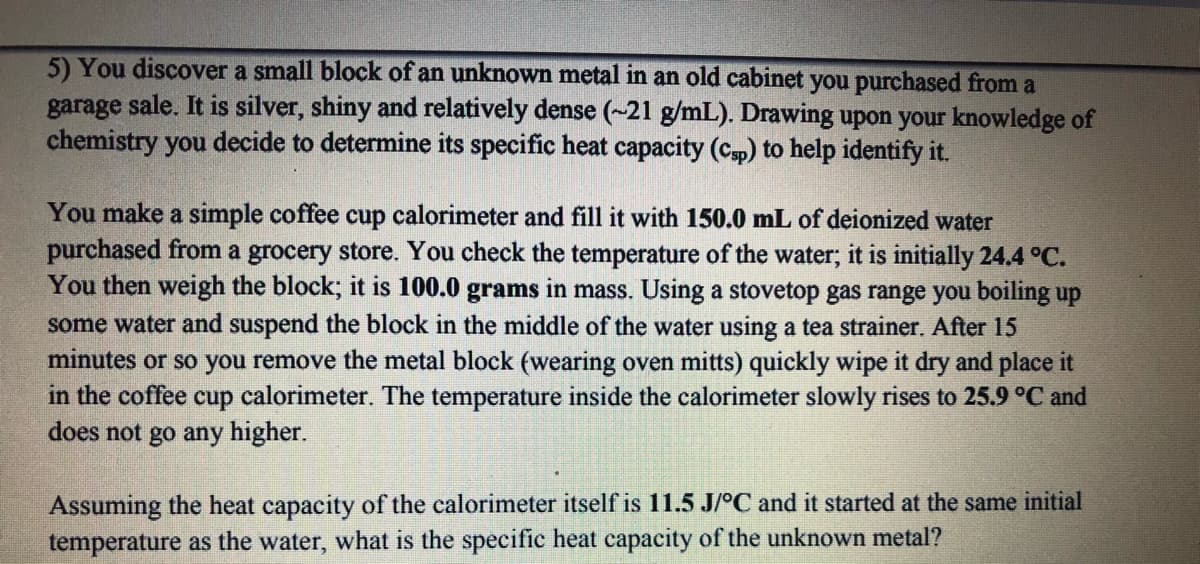5) You discover a small block of an unknown metal in an old cabinet you purchased from a garage sale. It is silver, shiny and relatively dense (~21 g/mL). Drawing upon your knowledge of chemistry you decide to determine its specific heat capacity (C-p) to help identify it. You make a simple coffee cup calorimeter and fill it with 150.0 mL of deionized water purchased from a grocery store. You check the temperature of the water; it is initially 24.4 °C. You then weigh the block; it is 100.0 grams in mass. Using a stovetop gas range you boiling up some water and suspend the block in the middle of the water using a tea strainer. After 15 minutes or so you remove the metal block (wearing oven mitts) quickly wipe it dry and place it in the coffee cup calorimeter. The temperature inside the calorimeter slowly rises to 25.9 °C and does not go any higher. Assuming the heat capacity of the calorimeter itself is 11.5 J/°C and it started at the same initial temperature as the water, what is the specific heat capacity of the unknown metal?
5) You discover a small block of an unknown metal in an old cabinet you purchased from a garage sale. It is silver, shiny and relatively dense (~21 g/mL). Drawing upon your knowledge of chemistry you decide to determine its specific heat capacity (C-p) to help identify it. You make a simple coffee cup calorimeter and fill it with 150.0 mL of deionized water purchased from a grocery store. You check the temperature of the water; it is initially 24.4 °C. You then weigh the block; it is 100.0 grams in mass. Using a stovetop gas range you boiling up some water and suspend the block in the middle of the water using a tea strainer. After 15 minutes or so you remove the metal block (wearing oven mitts) quickly wipe it dry and place it in the coffee cup calorimeter. The temperature inside the calorimeter slowly rises to 25.9 °C and does not go any higher. Assuming the heat capacity of the calorimeter itself is 11.5 J/°C and it started at the same initial temperature as the water, what is the specific heat capacity of the unknown metal?
Chemistry: The Molecular Science
5th Edition
ISBN:9781285199047
Author:John W. Moore, Conrad L. Stanitski
Publisher:John W. Moore, Conrad L. Stanitski
Chapter4: Energy And Chemical Reactions
Section4.8: Measuring Reaction Enthalpies: Calorimetry
Problem 4.17E
Related questions
Question
Also, what metal is it?

Transcribed Image Text:5) You discover a small block of an unknown metal in an old cabinet you purchased from a
garage sale. It is silver, shiny and relatively dense (~21 g/mL). Drawing upon your knowledge of
chemistry you decide to determine its specific heat capacity (csp) to help identify it.
You make a simple coffee cup calorimeter and fill it with 150.0 mL of deionized water
purchased from a grocery store. You check the temperature of the water; it is initially 24.4 °C.
You then weigh the block; it is 100.0 grams in mass. Using a stovetop gas range you boiling up
some water and suspend the block in the middle of the water using a tea strainer. After 15
minutes or so you remove the metal block (wearing oven mitts) quickly wipe it dry and place it
in the coffee cup calorimeter. The temperature inside the calorimeter slowly rises to 25.9 °C and
does not go any higher.
Assuming the heat capacity of the calorimeter itself is 11.5 J/°C and it started at the same initial
temperature as the water, what is the specific heat capacity of the unknown metal?
Expert Solution
This question has been solved!
Explore an expertly crafted, step-by-step solution for a thorough understanding of key concepts.
This is a popular solution!
Trending now
This is a popular solution!
Step by step
Solved in 2 steps

Knowledge Booster
Learn more about
Need a deep-dive on the concept behind this application? Look no further. Learn more about this topic, chemistry and related others by exploring similar questions and additional content below.Recommended textbooks for you

Chemistry: The Molecular Science
Chemistry
ISBN:
9781285199047
Author:
John W. Moore, Conrad L. Stanitski
Publisher:
Cengage Learning

Chemistry for Engineering Students
Chemistry
ISBN:
9781337398909
Author:
Lawrence S. Brown, Tom Holme
Publisher:
Cengage Learning

Principles of Modern Chemistry
Chemistry
ISBN:
9781305079113
Author:
David W. Oxtoby, H. Pat Gillis, Laurie J. Butler
Publisher:
Cengage Learning

Chemistry: The Molecular Science
Chemistry
ISBN:
9781285199047
Author:
John W. Moore, Conrad L. Stanitski
Publisher:
Cengage Learning

Chemistry for Engineering Students
Chemistry
ISBN:
9781337398909
Author:
Lawrence S. Brown, Tom Holme
Publisher:
Cengage Learning

Principles of Modern Chemistry
Chemistry
ISBN:
9781305079113
Author:
David W. Oxtoby, H. Pat Gillis, Laurie J. Butler
Publisher:
Cengage Learning

Chemistry
Chemistry
ISBN:
9781305957404
Author:
Steven S. Zumdahl, Susan A. Zumdahl, Donald J. DeCoste
Publisher:
Cengage Learning


Chemistry: An Atoms First Approach
Chemistry
ISBN:
9781305079243
Author:
Steven S. Zumdahl, Susan A. Zumdahl
Publisher:
Cengage Learning